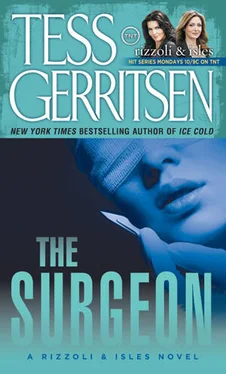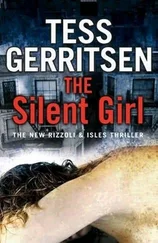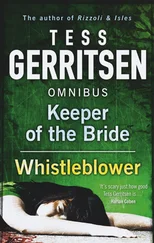The rest of the page was indecipherable.
“You’ll have to translate for me,” he said.
She glanced over her shoulder at him, and their faces were suddenly so close he felt his breath catch.
“You can’t read it?” she asked.
“I can read tire tracks and blood splatters. This I can’t read.”
“It’s Ken Kimball’s handwriting. I recognize his signature.”
“I don’t even recognize it as English.”
“To another doctor, it’s perfectly legible. You just have to know the code.”
“They teach you that in medical school?”
“Along with the secret handshake and the decoder ring instructions.”
It felt strange to be trading quips over such grim business, even stranger to hear humor come from Dr. Cordell’s lips. It was his first glimpse of the woman beneath the shell. The woman she’d been before Andrew Capra had inflicted his damage.
“The first paragraph is the physical exam,” she explained. “He uses medical shorthand. HEENT means head, ears, eyes, nose, and throat. She had a bruise on her left cheek. The lungs were clear, the heart without murmurs or gallops.”
“Meaning?”
“Normal.”
“A doctor can’t just write: ‘The heart is normal’?”
“Why do cops say ‘vehicle’ instead of just plain ‘car’?”
He nodded. “Point taken.”
“The abdomen was flat, soft, and without organomegaly. In other words—”
“Normal.”
“You’re catching on. Next he describes the… pelvic exam. Where things are not normal.” She paused. When she spoke again, her voice was softer, drained of all humor. She took a breath, as though to draw in the courage to continue. “There was blood in the introitus. Scratches and bruising on both thighs. A vaginal tear at the four o’clock position, indicating this was not a consensual act. At that point Dr. Kimball says he stopped the exam.”
Moore focused on the final paragraph. This he could read. This contained no medical shorthand.
Patient became agitated. Refused collection of rape kit. Refused to cooperate with any further intervention. After baseline HIV screen and VDRL drawn, she dressed and left before authorities could be called.
“So the rape was never reported,” he said. “There was no vaginal swab. No DNA collected.”
Catherine was silent. She stood with head bowed, her hands clutching the binder.
“Dr. Cordell?” he said, and touched her shoulder. She gave a start, as though he had burned her, and he quickly took his hand away. She looked up, and he saw rage in her eyes. There was a fierceness radiating from her that made her, at that moment, every bit his equal.
“Raped in May, butchered in July,” she said. “It’s a fine world for women, isn’t it?”
“We’ve spoken to every member of her family. No one said anything about a rape.”
“Then she didn’t tell them.”
How many women keep their silence? he wondered. How many have secrets so painful they cannot share them with the people they love? Looking at Catherine, he thought about the fact that she, too, had sought comfort in the company of strangers.
She took the encounter out of the binder for him to photocopy. As he took it, his gaze fell on the doctor’s name, and another thought occurred to him.
“What can you tell me about Dr. Kimball?” he said. “The one who examined Elena Ortiz?”
“He’s an excellent physician.”
“He usually works the night shift?”
“Yes.”
“Do you know if he was on duty last Thursday night?”
It took her a moment to register the significance of that question. When she did, he saw she was shaken by the implications. “You don’t really think—”
“It’s a routine question. We look at all the victim’s prior contacts.”
But the question was not routine, and she knew it.
“Andrew Capra was a doctor,” she said softly. “You don’t think another doctor—”
“The possibility has occurred to us.”
She turned away. Took an unsteady breath. “In Savannah, when those other women were murdered, I just assumed I didn’t know the killer. I assumed that if I ever did meet him, I’d know it. I’d feel it. Andrew Capra taught me how wrong I was.”
“The banality of evil.”
“That’s exactly what I learned. That evil can be so ordinary. That a man I’d see every day, say hello to every day, could smile right back at me.” She added, softly: “And be thinking of all the different ways he’d like to kill me.”
It was dusk when Moore walked back to his car, but the heat of day still radiated from the blacktop. It would be another uncomfortable night. Across the city, women would sleep with windows left open to the night’s fickle breezes. The night’s evils.
He stopped and turned toward the hospital. He could see the bright red “ER” light, glowing like a beacon. A symbol of hope and healing.
Is that your hunting ground? The very place where women go to be healed?
An ambulance glided in from the night, lights flashing. He thought of all the people who might pass through an E.R. in the course of a day. EMT’s, doctors, orderlies, janitors.
And cops. It was a possibility he never wanted to consider, yet it was one he could never dismiss. The profession of law enforcement holds a strange allure for those who hunt other human beings. The gun, the badge, are heady symbols of domination. And what greater control could one exercise than the power to torment, to kill? For such a hunter, the world is a vast plain teeming with prey.
All one has to do is choose.
There were babies everywhere. Rizzoli stood in a kitchen that smelled like sour milk and talcum powder as she waited for Anna Garcia to finish wiping apple juice from the floor. One toddler was clinging to Anna’s leg; a second was pulling pot lids out of a kitchen cabinet and clanging them together like cymbals. An infant was in a high chair, smiling through a mask of creamed spinach. And on the floor, a baby with a bad case of cradle cap was crawling around on a treasure hunt for anything dangerous to put in his greedy little mouth. Rizzoli did not care for babies, and it made her nervous to be surrounded by them. She felt like Indiana Jones in the snake pit.
“They’re not all mine,” Anna was quick to explain as she limped over to the sink, the toddler hanging on like a ball and chain. She wrung out the dirty sponge and rinsed her hands. “Only this one’s mine.” She pointed to the baby on her leg. “That one with the pots, and the one in the high chair, they belong to my sister Lupe. And the one crawling around, I baby-sit him for my cousin. As long as I’m home with mine, I thought I might as well watch a few more.”
Yeah, what’s another smack on the head? thought Rizzoli. But the funny thing was, Anna did not look unhappy. In fact, she scarcely seemed to notice the human ball and chain or the clang-clang of the pots slamming against the floor. In a situation that would give Rizzoli a nervous breakdown, Anna had the serene look of a woman who is exactly where she wants to be. Rizzoli wondered if this was what Elena Ortiz would have been like one day, had she lived. A mama in her kitchen, happily wiping up juice and drool. Anna looked very much like the photos of her younger sister, just a little plumper. And when she turned toward Rizzoli, the kitchen light shining directly on her forehead, Rizzoli had the chilling sensation that she was staring at the same face that had looked up at her from the autopsy table.
“With these little guys around, it takes me forever to do the smallest thing,” said Anna. She picked up the toddler hanging on her leg and propped him expertly on one hip. “Now, let me see. You came for the necklace. Let me get the jewelry box.” She walked out of the kitchen, and Rizzoli felt a moment of panic, left alone with three babies. A sticky hand landed on her ankle and she looked down to see the crawler chewing on her pant cuff. She shook him off and quickly put a safe distance between her and that gummy mouth.
Читать дальше












